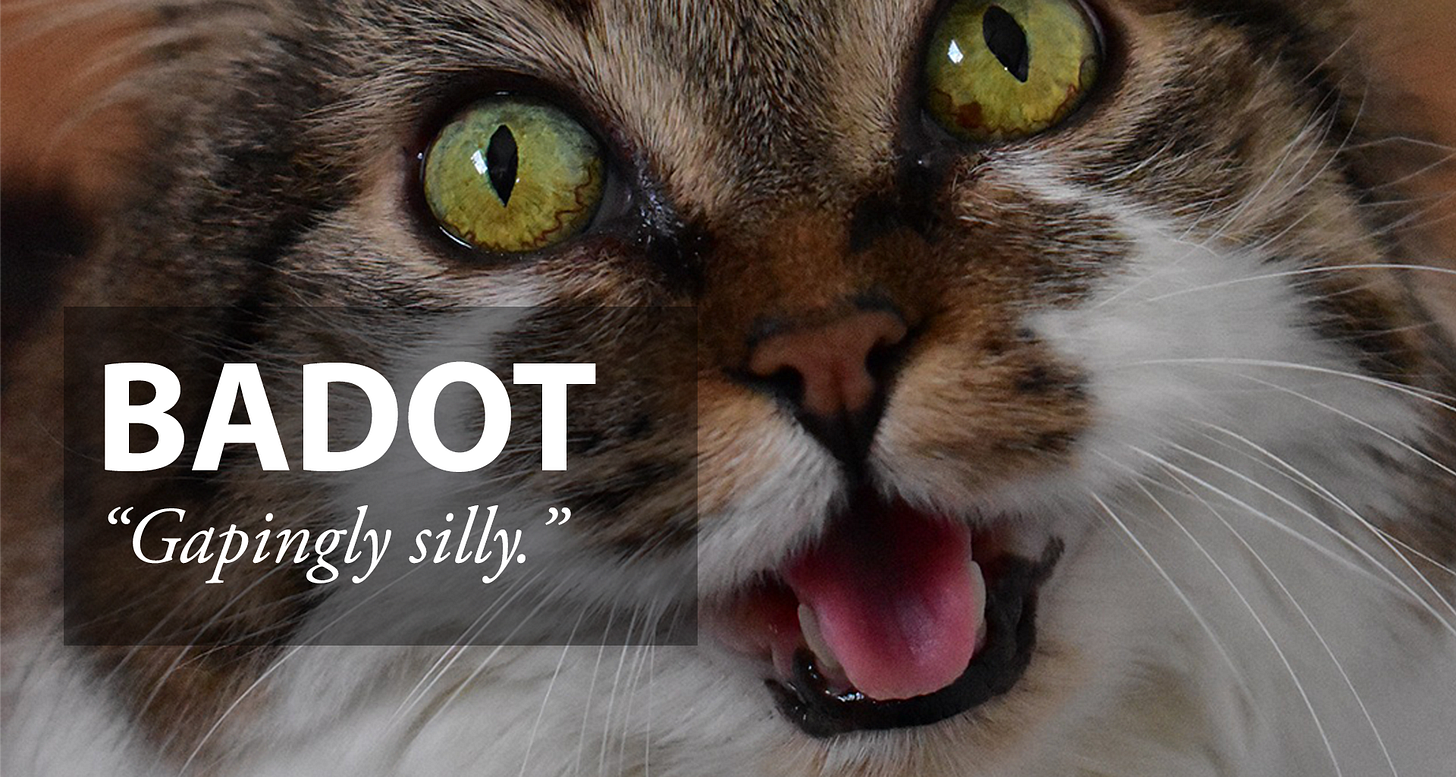9 Real Words That Those Cowards at Wordle Are Too Scared to Use
They need to correct this badot situation, blive!
No puzzle from me this week, but here’s a nice one from PostMark on MyCrossword. My crash course on how to do cryptic puzzles begins here.
For too long, we’ve allowed those skulking milksops at Wordle to cower in the protective enclaves of their ivory tower (I’m assuming — I’ve never actually been to The New York Times offices) and decide which five-letter words are TOO SCARY to include in their precious puzzle! Are we really going to allow ourselves to be coddled by these tyrannical word police? Are we going to let these imperious ninnies stifle us, five miserable letters at a time, just because they don’t have the strength of purpose to reach beyond the tiny little world of “Wordle-appropriate” 5-letter words that their myopia allows them to see?
Well, yes, probably. Wordle’s a really nice way to start the day, and I’d absolutely hate to break my streak. But here are some genuinely delightful 5-letter-words that you’re extremely unlikely to see as a Wordle solution (at least until the revolution comes).
From the French badaud, meaning “foolish,” via the Medieval Latin word badare, meaning “to gape,” “badot” is a rare but charming insult that suggests a cretin with mouth agape. With its tasteful combination of vowels and consonants, this would make a nice starter word if those cowards at Wordle had the moral courage to look past the fact that it had mostly vanished from the English language by the 17th century.
Well, I say that if it was good enough for Rabelais (who used it to describe Parisians generally), it ought to be good enough for the Gray Lady!
For the people of Paris are so sottish, so badot, so foolish and fond by nature, that a juggler, a carrier of indulgences, a sumpter-horse, or mule with cymbals or tinkling bells, a blind fiddler in the middle of a cross lane, shall draw a greater confluence of people together than an evangelical preacher.
– Rabelais, Gargantua and Pantagruel, Chapter XVII
A truncation of “belive” or “by life,” “blive” means “with liveliness,” “immediately,” or (if you’re feeling fancy) “forthwith.” What’s particularly nice about this word is that when we all go to protest outside Wordle HQ to get them to include it in their wordlist, we can do a rousing chant that goes, “What do we want? Blive. When do we want it? Blive.” Good stuff.
How many times have you found yourself struggling to no avail for a quick way to describe either a fox or a badger hurling their excrement at something? Personally, it’s too many to count. But it turns out you can do it in five economical letters — everywhere except Wordle, that is, which is too milk-livered to allow “fiant” (from the Old French fient, via the Latin fimum, meaning “dung”) in their high-falutin’ dictionary.
Fiant can mean the casting of animal excrement generally, but it tends (or tended—it doesn’t get used much lately for some reason) to be reserved for foxes and badgers, as in this passage (with an alternate spelling) from The Noble Art of Hunting, by George Gascoigne (published in 1575).
The Badgerd pigges at comming out of the earth do commonly make and cast their fyaunts: and they neuer do it vntill they haue made a hole in the earth with theyr snowte or with their foote: and then they fyaunt within it and hide it: this the Foxe cubbes do not.
“Fleer” can mean “one who flees” (an act those spineless pushovers at Wordle are doubtless all too familiar with!), but via a different, probably Scandinavian, root, it has the lovely meaning “to laugh impudently” at someone. Given that laughing impudently is almost certainly in the top 5 pleasures of life, this really should be in more common usage.
“Illth,” meaning “lack of well-being,” by back-formation from “wealth,” was championed most famously by the 19th century English intellectual John Ruskin, who made a case for it in his essay Unto This Last, where it appears in the midst of a spectacular 185-word run-on sentence that I’m going to spare you, as follows:
… as mere accidental stays and impediments acting not as wealth, but (for we ought to have a correspondent term) as ‘illth’ …
Ruskin is also famous for procrastinating the consummation of his marriage for six years, so he’s not exactly batting 1000 on good ideas, but I think that “illth” is a real winner and that the Wordle people are fools to leave it out. Just like Ruskin was. I’ll see myself out.
The Oxford English Dictionary defines “looby” as “A lazy hulking fellow; a lout; an awkward, stupid, clownish person,” which, as definitions go, really feels like kicking someone when they’re down.
George Eliot uses it rather nicely in Middlemarch to remind the reader that loobiness™ is an affliction that transcends social hierarchy:
While I tell the truth about loobies, my reader's imagination need not be entirely excluded from an occupation with lords.
But the most common usage tends to be reserved for disappointing sons, making the word an early version of what we’d nowadays call a “failson.” As in the following absolutely brutal burn from R.D. Blackmore’s Mary Anerley:
Widow Precious had plenty of sharp sense to tell her that her children were by no means “pretty dears” to anybody but herself, and to herself only when in a very soft state of mind; at other times they were but three gew-mouthed lasses, and two looby loons with teeth enough for crunching up the dripping-pan.
Derived from the same root that gives us the English word “come,” (via a process that goes something like: coming > fitting > satisfactory) “queme” usually turns up in the formation: “to someone’s queme,” as in “to someone’s satisfaction.”
You can use it in a lovely sentence like “It is very much to my queme to fleer at the badot loobies at the Times who insist on ignoring half the dictionary,” but try to use it in a Wordle and the jackbooted Wordle police will turn up at your door and haul you off to the stockades!
I was surprised to see that Wordle chose “SNAFU” as an answer for the puzzle last month, given that it’s a) an acronym, and b) contains an expletive (unless you define it as Situation Normal, All Fouled-Up), but, tragically, this doesn’t seem to have opened the door to any of the other fun five-letter World War II slang acronyms in the same vein.
This means that the miserable stuffed shirts at Wordle are wilfully choosing to deprive us of JANFU (Joint-Army-Navy-Foul-Up), TARFU (Things Are Really Fouled Up), TUIFU (The Ultimate In Foul-Up) and the marvelous SAPFU (Surpassing All Previous Foul-Ups). Given the recent appearance of SNAFU, it’s possible that we’ll one day see the similarly popular FUBAR (Fouled Up Beyond Any Recognition), but I’m not holding my breath.
Via the German brüllen (“to shout or bellow”), a “brool” is a low roar, much like the sound you make when you enter “badot,” “fiant,” or “sapfu” into your Wordlebox only to be met, blive, with a kick in the teeth.
Astonishingly, “blive,” “fleer,” “illth,” “looby,” “queme,” and “brool” itself are all currently allowed in Wordle’s dictionary (you can check them yourself), so I take back everything I said about the nice Wordle people being cowards and look very much forward to seeing all these solutions in future puzzles.















Made me chortle, snigger, smirk, titter...
this is brilliant!!! and true confessions, i only got through half; then i needed to slow down. I LOVE WORDS! Thank you. i too fully intend to reclaim language - and it seems my fellow stackers feel the same. May we remain ever elegant and poetic in expressing the obvious; and may we be carried on that higher vibe